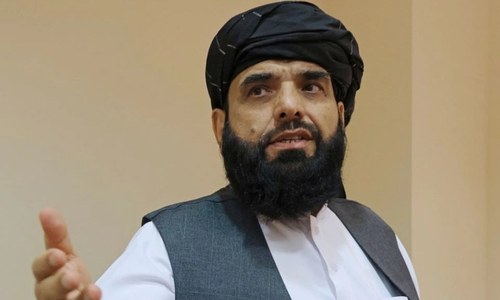THE events of mid-August stunned the world; even the Afghan Taliban were surprised at the ease and speed with which they overwhelmed the entire country. Salute to their faith, their valour and their grit. This is their moment. The United States has suffered a setback. But superpowers do not fade away; they are systems that shape world affairs. Russia suffered a setback, and today along with China it is managing the heartland of Asia.
The Afghan Taliban leadership faces huge challenges, internal and external adversaries, internal dissensions and divisions, riled-up human rights and liberal groups, powerful hostile lobbies and media — especially in the West — and the need for international recognition. But first and foremost, they have to put together an effective government with a semblance of the promised inclusiveness and reconciliation. Even when they succeed, they will need space to settle down. Outsiders must show patience. The Afghan leadership, in particular the Taliban leaders, have the primary responsibility of averting a civil war. Their neighbours and the world community must do everything they can to help achieve that objective. The world community must be generous with humanitarian assistance to prevent further aggravation of the suffering of the Afghan people. Pakistan should also brace itself for a possible influx of refugees.
If the situation moves towards stability, how should we look at the future Afghanistan, the region and the world? This may sound naïve in a pitiless, tension-ridden international environment, but the speculation is still well worth it if we claim that the development in Afghanistan bears lessons. There is room for optimism in the current maelstrom of the worldwide discussion on Afghanistan.
Arguably, a stable Afghanistan will remove a blockage and open up the entire surrounding region for economic activity. Much has already been said about opportunities, communications, trade and energy links and economic activity. Regional countries have a role and capacity, but all this will boil down to idle talk if there is an absence of purposeful engagement, or regional rivalries are reasserted for political influence or resources, and conflict returns to Afghanistan. Among the neighbours, in a range of unique but familiar factors, Pakistan has an important role to play. It will require both circumspection and prudence to enable itself and Afghanistan to be sovereign co-partners for the benefit of the region.
Will the developments in Afghanistan become a point of inflection for relations in South Asia?
Past experience validates concerns regarding spoilers, but the new environment may well help mitigate the potential for mischief. Meanwhile, Pakistani policymakers need to be cautious about pushing the new Afghan government over bilateral issues. Addressing the TTP has to be in tandem with their capacities and sensitivities. Here similar international concerns especially those of China and Russia work to Pakistan’s advantage and can help counterterrorism coordination at the bilateral and regional levels.
Given the historical background, Pakistani policymakers should learn to treat the border as a non-issue. The Durand Line is the de facto border (for Pakistan also de jure), reinforced by the two superpower interventions. It needs to be managed. We would do better to avoid delusional strategic clichés to articulate our relations with Afghanistan. They only offend sensitive and proud Afghans.
Given the historical distrust, Pakistan will be uneasy and suspicious of the Indian outreach in Afghanistan. Yet India’s role as a regional player cannot be wished away. Kabul will have an interest in accommodating any Indian push to rebuild relations. Of course, Pakistan cannot countenance the use of Afghan territory for subversion. On the other hand, there can be no exception to salutary Indo-Afghan cooperation based on the accepted norms of interstate relations. As for Pakistan, the unique assets of population overlap, contiguity, common geography and culture should enable it to proceed with a certain confidence in its relations with Afghanistan.
A deeper question is whether the momentous developments in Afghanistan could become a point of inflection for relations in South Asia. There are already rumblings in policy circles in Islamabad for an emphasis on geoeconomics. Economic opportunities will demand a hard rethink on geopolitical approaches and will require tough decisions. It is still too much to expect that the two principal protagonists in South Asia can change and focus on the huge challenges — ranging from poverty alleviation to climate change — staring them in the face.
Read: As US leaves Afghanistan, new regional 'Great Game' looms
Can the events of August induce an introspection among those driven by American exceptionalism and the primacy of Western civilisation? In the last two decades, the same thinking propelled American military engagement in the larger Middle East causing so much death and destruction. The same thinking is now poised to push for a global confrontation to contain a perceived rising rival power, China. The charge is: China is using its economic prowess to supplant Western values and displace the Western model of development and democratic polity. Across the globe there is not a shred of evidence of China peddling its system despite its deep economic engagement in every continent.
The evidence is to the contrary. Even in its most benign phase the West nursed a desire to change China through trade. Old cultures are tenacious. But China does not regard Western civilisation as antagonistic and has never displayed a desire to influence it. If the West espouses individual freedoms, the Chinese have for centuries placed a premium on discipline for the equanimity of their social and political system.
Beyond cultural and civilisational arguments, can global confrontation and games of containment be justified in this fraught global environment, and when global cooperation is imperative to face and overcome so many existential challenges that threaten humanity? If the events of August inject sobriety and prompt new awareness, it will be a gift from the most unlikely of sources imaginable.
The writer is an author and former foreign secretary.
Published in Dawn, September 4th, 2021















































